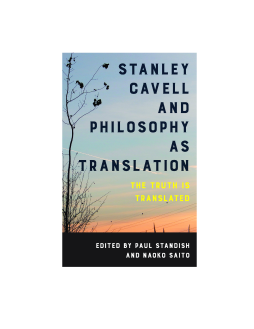
Additional Information
Book Details
Abstract
Translation exposes aspects of language that can easily be ignored, renewing the sense of the proximity and inseparability of language and thought. The ancient quarrel between philosophy and literature was an early expression of a self-understanding of philosophy that has, in some quarters at least, survived the centuries. This book explores the idea of translation as a philosophical theme and as an important feature of philosophy and practical life, especially in relation to the work of Stanley Cavell.
The essays in this volume explore philosophical questions about translation, especially in the light of the work of Stanley Cavell. They take the questions raised by translation to be of key importance not only for philosophical thinking but for our lives as a whole. Thoreau’s enigmatic remark “The truth is translated” reveals that apparently technical matters of translation extend through human lives to remarkable effect, conditioning the ways in which the world comes to light. The experience of the translator exemplifies the challenge of judgement where governing rules and principles are incommensurable; and it shows something of the ways in which words come to us, opening new possibilities of thought. This book puts Cavell’s rich exploration of these matters into conversation with traditions of pragmatism and European thought. Translation, then, far from a merely technical matter, is at work in human being, and it is the means of humanisation. The book brings together philosophers and translators with common interests in Cavell and in the questions of language at the heart of his work.
Naoko Saito is Associate Professor of Education at Kyoto University, Japan. Her publications include The Gleam of Light: Moral Perfectionism and Education in Dewey and Emerson (2005).
Paul Standish is Professor of Philosophy of Education and Head of the Centre for Philosophy and Education at UCL Institute of Education, UK. His many publications include The Therapy of Education (2007), co-authored with Paul Smeyers and Richard Smith, and The Philosophy of Nurse Education (2007), co-edited with John Drummond. With Naoko Saito he has also co-edited Stanley Cavell and the Education of Grownups (2012) and Education and the Kyoto School of Philosophy: Pedagogy for Human Transformation (2012). He was previously Editor of the Journal of Philosophy of Education and is Chair Elect of the Philosophy of Education Society of Great Britain.
There is an important sense in which a demand for translation is internal to all thought and, by the same token, an important sense in which translation should be regarded as a topic for, and dimension of, philosophical investigation. That is organizing claim of Naoko Saito and Paul Standish’s brilliant new collection Stanley Cavell and Philosophy as Translation. The book offers something substantial not only to those committed to following philosophical conversations about themes of translation but also to those committed to exploring these conversations’ practical upshot. It makes an especially focused contribution to discussions of education as an enterprise that, far from being merely technical and problem-oriented, is capable of opening us to the ineluctable demand to exercise our own judgment in thinking.
Alice Crary, Chair of Philosophy, New School for Social Research
Thoreau’s observation that truth requires the departure or translation from the “monuments” constituted by our words provides the theme of this probing collection. Charting paths to and from Cavell’s own words in The Senses of Walden, these fine essays consider translation and the untranslatable, Cavell’s notions of the ordinary and of speaking out of a sense of impoverishment, and writers from Emerson to Terrence Malick.
Russell B. Goodman, Regents Professor, Emeritus, University of New Mexico
Saito and Standish are full-fledged masters of bringing the best excitement of living philosophical conversation in book form. Provoked by an enlarged sense of translation as more than decoding and of education as more than classroom learning, these essays bring us to feel that, as Cavell might say, we mostly use those words without meaning what we are saying. In an age when the simply practical or instrumental is in ascendence, this international collection is an event which will arrest resignation, recalling us to philosophy's and education's significance as existential transfiguration.
Gordon C.F. Bearn, Professor of Philosophy, Lehigh University
Table of Contents
| Section Title | Page | Action | Price |
|---|---|---|---|
| Contents | 11 | ||
| Introduction | 13 | ||
| 1 Philosophy as Translation and the Realism of the Obscure | 23 | ||
| 2 Stanley Cavell, the Ordinary, and the Democratization of Culture(s) | 37 | ||
| 3 Speaking Out of a Sense of Our Impoverishment | 57 | ||
| 4 Rebuking Hopelessness | 73 | ||
| 5 From Radical Translation to Radical Translatability | 85 | ||
| 6 Problems in Translation | 101 | ||
| 7 Pragmatism and the Language of Suffering | 115 | ||
| 8 Communication as Translation | 133 | ||
| 9 The Strange in the Familiar | 153 | ||
| 10 Immigrancy of the Self, Continuing Education | 171 | ||
| 11 The Philosophy of Pawnbroking | 183 | ||
| Index | 195 | ||
| About the Contributors | 203 |
